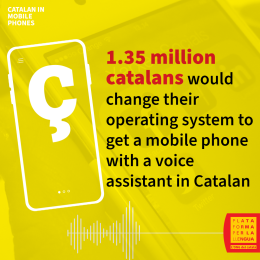1.35 million Catalans would consider changing their operating system to get a mobile phone voice assistant in Catalan. That is the most important result of a survey commissioned by Plataforma per la Llengua from GESOP. Breaking it down depending on the operating system they currently have, 925,000 of them would leave Android and 275,000 would switch from the iPhone system. These figures show that whether or not a Catalan voice assistant is available is an important factor for consumers when it comes to buying a mobile phone.
The differences in absolute figures are due to the fact that, as the same survey indicates, approximately 70% of Catalans currently have an Android phone and only about 20% have an iPhone. In fact, the percentage of users prepared to change operating system to get an assistant in Catalan is similar in users of the two systems.
None of the existing voice assistants currently speaks Catalan: not Alexa (Amazon), or Siri (Apple), or Google Assistant, or Bixby (Samsung), or any other. While Alexa can speak only eight languages, Siri (iPhone) can speak about 20, including Finnish, Hebrew, Danish and Norwegian, languages which have a similar or lower number of speakers than Catalan. This is due to the misconception that Catalan users will be comfortable using the Spanish versions - an idea which this survey refutes.
The only assistant that can understand Catalan is Google Assistant, the Android voice assistant, which is also the one that leads the ranking for the number of languages it speaks, at almost 50. Although Catalan is, unfortunately, not one of these languages, if we bear in mind that it already understands Catalan, it would not be surprising if Google Assistant were the first voice assistant to express itself in our language.
The fact that Google Maps does not offer guidance in Catalan even though it has the interface in that language means many users opt to set up their mobile phones in Spanish so that they can get voice directions. Others choose to download navigation apps with guidance in Catalan, such as Waze.
However, the absence of Catalan in the voice assistant sector is in contrast with the reasonable state of health it has enjoyed - and continues to enjoy - in the digital sphere. Most mobile phone or computer operating systems, digital platforms and the main websites have a Catalan version. The Catalan digital community has welcomed these initiatives and has responded very favourably, as shown by the fact that Twitter was translated into Catalan in a quarter of the time that it took for Arabic, even though it has only 1.5% of Arabic's native speakers, or that the Catalan version of Wikipedia is the 15th largest in number of articles and one of those that is growing the most (4% a year).




